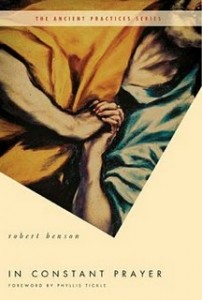 I just finished reading In Constant Prayer by Robert Benson, part of Thomas Nelson’s “The Ancient Practices Series.” This book was generally about the practice of praying the hours throughout the ages and in modern life. I was drawn to this book because praying the hours is something I am always seeking to learn more about, although the discipline of it all is daunting to a man like me who know my lack of such rigor.
I just finished reading In Constant Prayer by Robert Benson, part of Thomas Nelson’s “The Ancient Practices Series.” This book was generally about the practice of praying the hours throughout the ages and in modern life. I was drawn to this book because praying the hours is something I am always seeking to learn more about, although the discipline of it all is daunting to a man like me who know my lack of such rigor.
In Benson however, I found a companion who was willing to be open and honest about his own lack of discipline at this task. Although he writes on and lectures about prayer and praying the hours, his own practice is not always as pristine as his readers and hearers must imagine. This honesty was one of the most helpful things about this book. Many, including myself, that want to begin the practice of praying the hours, are intimidated thinking it would be like a fat man jumping into the p90X program on their first day of exercise. Benson, throughout this book, encourages through his openness all to begin to pray these prayers, knowing that their practice will not always be what they might desire.
He also does a great job of playing this practice right at the feet of every Christian. This is not the practice of Roman Catholic monks. It is not the practice of priests (he is a layman). It is the practice of God people first noted in Psalm 119:164, “Seven times a day I praise you for your righteous rules.” Yes, praying at 6am,9am,12pm,3pm,6pm,9pm,and 12pm had been a practice known to God people long before the monasteries took on the practice and perhaps gave it is most formal and beautiful forms. His openness and encouragement of this practice are helpful to anyone reading this book.
But there are aspects of this book that I found very troubling. Primarily that this practice is spoken of only as an offering given to God. He repeatedly say that this practice is not for you but for God. In so doing he turns time spent in the office into a mere work devoid of any talk of God’s grace given to the one praying. This review is not the place to explore the true sacrificial versus sacramental nature of praying the hours, but I will say that it is presented as solely sacrificial in this book. He does suggest that God “might” come and dwell with the prayer, but that one should not expect it. Surely God dwells through his word each time we pray and speak his Word whether our hearts note it or not.
The other thing that bothers me is his writing style. I prefer a linear argument leading from one point to another. Benson is easily sidetracked with his life experiences in this book. Sometimes they add to the point he is making, but more often they just feel like they are inserted because they occurred to him when he was writing. Others may not find this problematic, but to me it made it harder to really think through this practice.
Overall, I am glad I read this book, and I might save up to buy the Treasury of Daily Prayer.  The Pray Now App has been helpful but is still not quite the tool I desire.

Phil,
I’m curious about this “Ancient Practice Series” but even more curious about why the need for such a series exists. My question, why are all these books being published and promoted about the ancient practices of the church, from confession to anoninting with oil to fasting and now to the prayers of the daily office coming out now? These practices have only been abandoned by the Protestants and the great majority of Catholics in the wake of Vatican II. These disciplines and beliefs have been preserved by the Holy Orthodox Church. So, what gives? Why are the ancient practices, which even the most stringent reading of the BoC would not yield a condemnation of, now such a great point of interest?
Your explanation is the reason. The loss of these practices by the western church means they need to be reintroduced. I hope to send the book out to you tomorrow.
Phil,
So, why now? Why is it, all of a sudden, after all this time do a number of clergy and laity of the Western Christian confessions feel the need to bring these disciplines back? Why didn’t more Lutheran pastors back in the 1800s or the 1950s preach about the disciplines of fasting or the benefits of private confession or the praying of the hours? Those practices were gone then. What is the impetus driving this?
BTW, thanks for sending the book. I look forward to reading it.
Chris